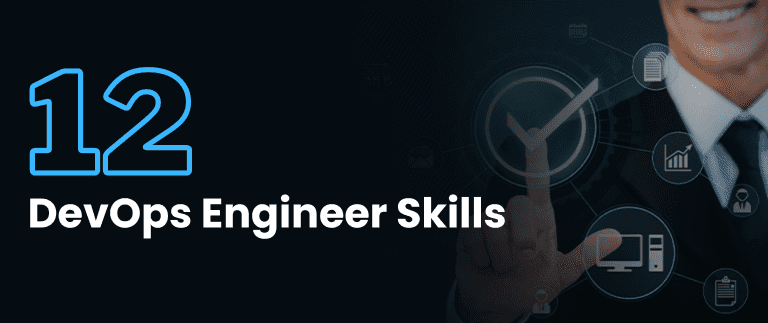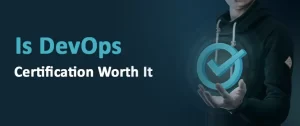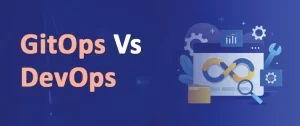The demand for DevOps engineers and managers is increasing day by day due to the growing number of IT companies. Consequently, many youngsters with IT backgrounds are quickly switching to this field. But what is DevOps, and what are DevOps engineer skills? It is a selection of philosophies, strategies, and practices that help to deliver services and applications more effectively for a company. DevOps processes help companies upgrade their products in ways that let them meet user requirements in a much better manner.
This is why DevOps engineers are in high demand. However, when you pursue a path to become a DevOps engineer, many facets, such as the latest DevOps trends relating to responsibilities and scope, come in handy to make an informed decision and find out the skills required for DevOps engineer, whether you are an experienced professional or a fresher. So, let us dig into the topic and find out everything related to DevOps engineer key skills and related points thereon.
.
Who is a DevOps Engineer?
He is an IT expert who pays attention to code deployments and releases in collaboration with developers, system operators, and other production IT members. Right from code deployment and release to code maintenance and updates, a DevOps engineer introduces tools, processes, and techniques to stabilize needs during the life cycle of software development.
Some organizations may pay general professionals to perform DevOps for their company’s workflow. However, this kind of approach only widens the gap between operations teams and developers as successful DevOps adoption demands changes in techniques and culture. So, there has to be a structured and well-organized workflow to ensure sync between developers and the operations teams.
Top 12 DevOps Engineer Skills
The role of any DevOps engineer is to manage an organization’s software development and delivery process. They have to ensure that software changes are done in a coordinated and controlled manner. There is a specific DevOps engineer skill set that you must possess to ensure success in this role. Here are the important DevOps skills that you need to master to get hired for a job.
Communication and Collaboration
DevOps is an approach which includes interacting with system administrators and programmers. As such, enriching communication and collaboration is necessary to keep teams in sync. Note that DevOps experts do not work for their goals but for the interests of the entire team and to reach a common goal. This cultural mindset is one of the key skills required for a DevOps engineer.
Soft Skills and Noble Thought
DevOps engineers have to work with others to build bridges and resolve conflicts between departments. They should think critically to solve problems speedily and effectively. As a result, these skills tend to be an essential part of any successful DevOps team. DevOps engineer soft skills help to develop a more positive work environment. When everyone is working together towards a common goal, it creates a sense of unity and boosts confidence. As a result, productivity increases, and every person involved benefits
Decision-Making
Decision-making is an art that top professionals must cultivate. DevOps engineers are a special mention in this respect. They have to make quick decisions amid changing development and deployment scenarios. Some things may go wrong during the development or delivery process.
As an engineer, you have to make pragmatic decisions on time to fix such issues. Failure in this aspect will lead to the failure of the product and the project. For this reason, DevOps managers and engineers have to be quick decision-makers.
Proactiveness
DevOps engineers must be self-motivated, innovative, learnable, passionate, and proactive. The desire to learn constantly will allow specialists to stay updated with relevant tools, new technologies, and progressive solutions, which is a must-have in this rapidly growing environment. You cannot know everything in this ever-evolving technology era, but DevOps is essentially a path of continuous growth.
Customer-Focused Approach
Engineers must ensure that everything they undertake aligns with user requirements and values. As a result, DevOps professionals should communicate and work closely with developers, project managers, testers, and others towards a common aim of attaining better customer satisfaction.
Understanding of Relevant Tools
Software development, testing, and delivery involve a myriad of processes. Since the whole procedure is automated, engineers and other team members have to be well-versed with the various resources and tools used during the project.
While each team or team member has to be familiar with a particular set of tools, engineers should understand the workings of all tools. They carry a wider responsibility compared to anyone involved in software development and deployment.
Issues may turn up at any given time during the project execution process. Those problems mostly pertain to code implementation, testing, and deployment. So, you must be familiar with the workings of each tool. Plus, you must know how to fix issues with those tools to ensure fast and error-free delivery of software products.
Security Skills
Protection and security are vital criteria while developing and deploying codes. This indicates that engineers should possess the right security DevOps skill set and knowledge to write highly secure codes. It reduces risk, protects software/apps from possible attacks and hacks, ensures a low failure rate, and minimizes defects throughout the product’s life cycle.
Automation Skills
Automating each process and facilitating work is one of the main skills needed for DevOps jobs. A highly-skilled engineer must be capable of automating the whole pipeline, including continuous integration and delivery, infrastructure, configurations, application performance tracking, and so on.
Essentially, the automation skill set is related to knowledge of the required toolset, scripting languages, and coding. Automation technologies and tools facilitate all manual tasks and workflows, resulting in faster software development and deployment.
A skilled engineer in DevOps will need the skills and knowledge of Python, GNU, JavaScript and PowerShell utilities, AWS Lambda, cron, SNS, CloudWatch Events, and others.
Coding and Scripting
Although programming skills are essential for all development methods, DevOps engineers play a key role in writing codes. The organization of an efficient, stable, and maximally automated pipeline or the makings of new solutions that help automate the pipeline phases for optimizing the team’s work are the main tasks here. A good engineer should work with multiple languages such as Ruby, Java, JavaScript, Python, Bash, PHP, Node.js, Shell, and more.
Cloud Skills
DevOps and Cloud are closely related in the development process, but the performance of one is dependent directly on the other. If DevOps solutions manage the whole process, then the Cloud employs this process, presenting it with the right environment to test, deploy, and release code.
Cloud computing skills, along with experience, let you design and make your own Cloud systems, simplify complicated Cloud systems, and implement best practices over a range of Cloud service offerings. Currently, the main Cloud services are Google Cloud, Microsoft Azure, IBM, and Amazon Web Services.
Testing Skills
Testing is necessary in DevOps to ensure that the changes made in the code do not cause any issues. Plus, testing assures you of the quality of the product in question. DevOps engineers must be capable of using automated testing tools such as Jenkins and Selenium.
Version Management Skills
As a DevOps engineer, one of the main responsibilities is to make sure that you can track all code changes and roll them back in the case of an issue. You have to have a strong configuration as well as version management skills required for DevOps engineer. That will let you do these chores effectively.
Configuration management refers to the process of managing environment variables as well as configuration files to ensure that all developers are working in line with the same set of configurations. It also ensures that no inconsistencies are present between environments.
Version management refers to the process of tracking different versions of configurations and codes. It helps to identify the problematic versions of codes so that you may roll back to a previous version before the problem worsens.
Knowledge of Various DevOps Tools and Technologies
True professionalism lies in being aware of different tools, concepts, and solutions in the software development process. The success of employing these practices largely depends on the set of tools implemented at different stages of the software project.
A DevOps engineer should know the usage of a chain of complex tools such as continuous integration servers, version control, automation processes, configuration management, monitoring and analytics, database administration, Infrastructure as Code tools, testing and Cloud technologies, and so on.DevOps engineer required skills involve understanding the roles and usage of each tool in the chain, considering dependencies, and ensuring that the solutions are combined fully at different stages of software development and operations. This approach results in the proper implementation of this methodology.
Source Code Management
The SCM or Source Code Management tools are used for managing the source codes of an application. They help to make sure that the code gets stored in a central repository. Plus, it ensures that tracking changes are easy
Configuration Management
These tools are employed to manage an application’s configuration. Their role is to make sure that the correct versions of the software product are deployed and that the setups are seamlessly consistent across environments.
Continuous Integration
Continuous integration (CI) and continuous delivery are the core of DevOps. It implies seamlessly integrating all codes from different developers, testing it continuously, and deploying relevant code to production. CI automates the integration of code into one piece of software, enabling data to combine efficiently.
Continuous Testing
The success of DevOps mainly depends on proper testing and quality. Automated tests must run permanently without failures. Continuous testing can reduce the time required to receive feedback after code testing to a great extent. DevOps specialists’ key task lies in speeding up the delivery of the product to customers as early as possible. The quality of the application to be delivered plays a key role here.
Engineers must test their work constantly and be familiar with popular automated continuous testing tools such as TestingWhiz, Selenium, and TestComplete, as well as continuous monitoring tools such as Splunk, Nagios, Zabbix, and others.
Continuous Monitoring
Continuous monitoring tools are used for monitoring systems and applications automatically to detect problems early and keep them from turning into major issues. DevOps engineers must be proficient with monitoring tools such as Splunk and Nagios. In addition to this, they must be capable of identifying production system problems, upgrading system versions, and applying security updates. These are a must in the DevOps engineering skills.
Containerization
Containerization is a method used for packaging a software product so that it can be deployed easily and quickly. It is one of the main technical skills required for DevOps engineers. Containerization is mostly done using containers such as Docker.
How to Develop DevOps Engineer Skills?
As a DevOps engineer, you must be well-versed in development as well as operations to become successful. Although there is no single way to become a DevOps engineer, there are certain key things that you should do to develop the required skills:
Practice
Thorough practice is the best way to become an expert in anything. When it boils down to learning to code and testing the skills for a DevOps engineer, working on real-world DevOps projects is an ideal way to practice. You will come across various online resources that can help you in finding coding projects to work on.
Once you find a project matching your interest, fork the repository and begin working on it. While you work on the project, make sure to document your process properly so that you may reference it later.
Attend Industry Events and Workshops
In addition to practicing your coding skills, you must get familiar with the different technologies and tools used in DevOps. Attending industry workshops and events is the best way to get familiar with these tools. Many of these events are either free or available at a low-cost. They provide an excellent opportunity to learn DevOps from industry experts.
Taking a Course
Taking a relevant DevOps course is another way to develop the skills required to become a successful DevOps engineer. Various expert-endorsed DevOps training programs can come in handy for learning everything from coding basics to more advanced concepts such as orchestration and containerization.
Learning and practicing are essential regardless of the approach you take. By continuously expanding your knowledge, you will be able to keep up with the ever-changing landscape of DevOps and become a well-rounded engineer.
Earn a Degree or Certificate in Project Management
Earning a degree/certificate in project management will help you master the DevOps engineer skills required to become successful in the field. Remember, project management is a vital aspect of DevOps. So, having formal training will give you a substantial advantage.
Various offline and online programs provide degrees/certificates in project management. Accredited institutions offer most of these programs. So, do your research properly before enrolling in any such program.
DevOps Community
The DevOps community provides an amazing opportunity to interact with other engineers and get familiar with the latest technologies and trends. Staying active in a community will let you stay updated on the recent DevOps news and acquire knowledge from other engineers. In addition to this, many communities provide opportunities for contributions to open-source projects, which is a wonderful way to build your portfolio and gain experience.
Work Experience
Although formal education and training are essential, nothing can replace real-world experience. You must have an in-depth understanding of the software development life cycle and the different technologies and tools used in the field to register success in DevOps. Working on projects that employ the DevOps methodology is the best way to get experience. Many companies now use DevOps. So, there are various opportunities to get involved. You may also look for internships or entry-level jobs at organizations that use the DevOps methodology. Working on projects will give you first-hand experience with the obstacles and challenges that you might face as a DevOps engineer. This experience will be highly valuable while you develop your knowledge and skills.
Final Words
DevOps is the future of the technology world, specifically in software development and deployment. Many organizations have understood the benefits and are employing this culture. This is why the demand for DevOps engineers is high. If you wish to enter this sector, get familiar with the DevOps engineer skills and the roles before applying for a job. If you stick to the above advice, you could get on the right path to success and make a remunerative career in DevOps.
| “Want to take your IT career to the next level? Explore our Advanced Cloud Native DevOps Master Program to enhance your DevOps career now!” |
Amol Shete
Senior Software Engineer
A well-experienced DevOps engineer who loves to discuss cloud, DevOps, and Kubernetes. An energetic team player with great communication & interpersonal skills.
FAQ's
Becoming an expert in this sector demands a sheer degree of knowledge. The following are the skills necessary to get hired in any company.
- Strong understanding of Linux Basics and Scripting, such as file handling, process management, text processing, and system administration.
- Knowledge of different methodologies as well as tools to fix code mistakes and resolve problems in deployment.
- Soft Skills such as communication and collaboration to bridge the gap between developers, IT operators, and managers.
The entry-level DevOps engineer salary is around 360,000 rupees a year in India. The average mid-level engineer’s salary is 1,500,000 rupees per year. Experienced engineers are paid as high as 1,600,000 rupees yearly.
Any DevOps engineer has a series of responsibilities to exercise in his position. He needs to manage the IT infrastructure that ensures seamless running of software codes in multi-tenant, dedicated, or hybrid cloud environments.
DevOps engineers have to provide resources, employ a testing procedure for each release validation, decide on a suitable deployment strategy, and monitor performance after the release. Test data preparation, problem debugging, analysis results, and establishing communication with software developers and IT operators rest on a DevOps engineer.





